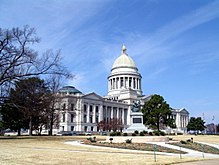Augustus Hill Garland
Augustus Hill Garland (born June 11, 1832 in Covington , Tipton County , Tennessee , † January 26, 1899 in Washington, DC ) was an American lawyer and politician. He was Minister of Justice of the United States and both Senator , and Governor of Arkansas . The Confederate Congressman Rufus King Garland (1830-1886) was his brother.
Studies and professional career
Garland first completed a general education course at St. Joseph's College in Bardstown (Kentucky) , which he finished in 1849 with a Bachelor of Arts (BA) . He then studied law and was admitted to the Arkansas bar in 1853 . After three years as a lawyer in Washington, Arkansas , he opened a law firm in Little Rock in 1856 . In 1860 he completed a legal internship at the United States Supreme Court .
Political career
Civil War
Garland began his political career in 1860 at the meeting of the Constitutional Union Party , which nominated John Bell for its presidential nomination and Edward Everett as a vice-presidential nominee. Shortly before the start of the Civil War , he was a delegate of the Arkansas Secession Convention , which had to vote in 1861 on the withdrawal of Arkansas from the Union . Garland, who had voted to remain in the Union, became a member of the Provisional Congress of the Confederate States in May 1861 . He was then from February 18, 1862 to November 8, 1864 a member of the House of Representatives of the Confederate Congress , then he was from November 8, 1864 to May 10, 1865 member of the Confederate Senate .
After the end of the Civil War, his license to practice as a lawyer was withdrawn, but was granted again in the summer of 1865 through a pardon by President Andrew Johnson . In 1866, he filed a lawsuit against his prior disqualification from the United States Supreme Court on the grounds that the decision to disqualify former Confederate politicians would violate the US Constitution . In a narrow 5: 4 ruling, the Supreme Court confirmed his view in its so-called ex parte Garland decision and decided that the admission to the bar was a Bill of Attainder that violated the constitution.
Governor and US Senator
In 1867 he was elected US Senator , but he was forbidden from exercising the mandate because Arkansas had not yet officially rejoined the United States.
In 1874 he was Acting Secretary of State for Arkansas for some time. In the same year he was elected governor of Arkansas. In his tenure, which lasted from November 12, 1874 to January 11, 1877, he founded the Branch Normal College , where African American teachers were trained. He also campaigned for financial support for schools for the blind and deaf. During his tenure, he also seriously dealt with the financial problems of Arkansas.
In 1876 he was reelected as a US Senator as a candidate for the Democratic Party and re-elected in 1882. As such, he represented the interests of the first Senate electoral district of Arkansas in the US Congress until March 6, 1885 . From March 1879 to March 1881 he was chairman of the Senate Committee on Territorial and Insular Affairs .
Attorney General under President Cleveland
On March 6, 1885, President Grover Cleveland appointed him as Attorney General in his cabinet . He held this office until the end of Cleveland's first term on March 4, 1889.
During his tenure as attorney general, he initiated pension fraud charges and asked President Cleveland to regulate trade between states as a matter of urgency . He also expanded the federal prison system . Controversy arose near the end of his tenure when the Department intervened in a lawsuit to dissolve the American Bell Telephone Company's monopoly and it was found that Garland was a shareholder in one of the companies. The subsequent investigation by Congress generated considerable public interest and ultimately crippled Garland's work.
After retiring as Attorney General, he practiced as a lawyer in Washington, DC . As such, he died during a hearing in the Supreme Court.
Publications
- A Treatise on the Constitution and Jurisdiction of the United States Courts
- Experiences in the Supreme Court of the United States, 1898
- Federal Practice, 1898
literature
- Watkins, Beverly Nettles: Augustus Hill Garland, 1832-1899: Arkansas Lawyer to United States Attorney-General , 1985, Auburn , Alabama
Web links
- Biography on the homepage of the Ministry of Justice ( Memento from June 1, 2009 in the Internet Archive ) (English)
- Augustus Garland in the National Governors Association (English)
- Augustus Hill Garland in the Biographical Directory of the United States Congress (English)
- Biography in US law lexicon (English)
- Biography at the Encyclopedia of Arkansas History and Culture (English)
- Online biographies of Arkansas governors
- Augustus Hill Garland in the Miller Center of Public Affairs of the University of Virginia (English)
- Augustus Hill Garland in the database of Find a Grave (English)
| personal data | |
|---|---|
| SURNAME | Garland, Augustus Hill |
| BRIEF DESCRIPTION | American lawyer and politician |
| DATE OF BIRTH | June 11, 1832 |
| PLACE OF BIRTH | Covington , Tennessee |
| DATE OF DEATH | January 26, 1899 |
| Place of death | Washington, DC |





